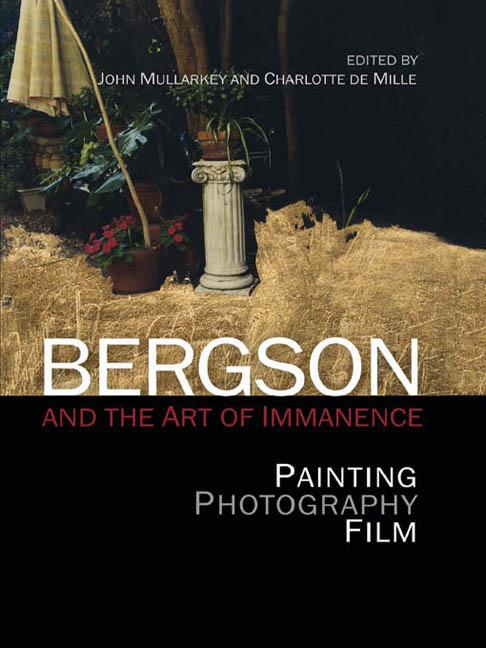Book contents
- Frontmatter
- Contents
- List of Illustrations
- Notes on Contributors
- Introduction: Art's Philosophy – Bergson and Immanence
- Part I Bergson, Art, History
- Part II Unconditional Practice
- 7 The Matter of the Image: Notes on Practice-Philosophy
- 8 Pasearse: Duration and the Act of Photographing
- 9 Duration and Rhetorical Movement
- 10 A Diagram of the Finite-Infinite Relation: Towards a Bergsonian Production of Subjectivity
- Part III Immanence of the Visible
- Afterword: An Art Historical Return to Bergson
- Index
10 - A Diagram of the Finite-Infinite Relation: Towards a Bergsonian Production of Subjectivity
from Part II - Unconditional Practice
Published online by Cambridge University Press: 07 December 2017
- Frontmatter
- Contents
- List of Illustrations
- Notes on Contributors
- Introduction: Art's Philosophy – Bergson and Immanence
- Part I Bergson, Art, History
- Part II Unconditional Practice
- 7 The Matter of the Image: Notes on Practice-Philosophy
- 8 Pasearse: Duration and the Act of Photographing
- 9 Duration and Rhetorical Movement
- 10 A Diagram of the Finite-Infinite Relation: Towards a Bergsonian Production of Subjectivity
- Part III Immanence of the Visible
- Afterword: An Art Historical Return to Bergson
- Index
Summary
… there is in matter something more than, but not something different from, that which is actually given. Undoubtedly, conscious perception does not compass the whole of matter, since it consists, in as far as it is conscious, in the separation, or the ‘discernment’ of that which, in matter, interests our various needs. But between this perception of matter and matter itself there is but a difference of degree and not of kind.
INTRODUCTORY REMARKS: MATTER AND MEMORY
Henri Bergson's Matter and Memory amounts to a revolution in thought, a radical ‘switch’ in how we understand ourselves, and especially our relation to the past (understood as that which is ‘outside’ our present experience). For Bergson, we are not composed of a body and of a mind inhered within the latter. Indeed, we are not a vessel or a container for our memories (Bergson's thesis is a critique of interiority in this sense), but more like a point or probe that is moving through matter and which is itself part of the very matter through which it moves. In order to negotiate this strange landscape, with its challenges to common (or Cartesian) sense, two principles are useful. The first, as Bergson himself suggests in his Foreword, is that we remember that all mental life, ultimately, is determined by action. An absolutely speculative function of the mind, divorced from experience and action, does not, for Bergson, exist (although, as we shall see, this does not prohibit a kind of speculation understood as intuition). The second principle, that in some sense follows from this, is that the past has not ceased to be, but has merely ceased to be useful as regards this action. It is in this sense, again as we shall see, that the past is co-extensive with the present. It survives in a pure, albeit unconscious, state.
In what follows I will be especially concerned with the status of, and possibility of accessing, this pure past, which might also be understood as a kind of ontological ground of our individual being. It is my contention, following Bergson, and especially Deleuze's reading of him, that this past might be a resource of sorts in the production of a specifically different kind of subjectivity.
- Type
- Chapter
- Information
- Bergson and the Art of ImmanencePainting, Photography, Film, Performance, pp. 165 - 186Publisher: Edinburgh University PressPrint publication year: 2013



